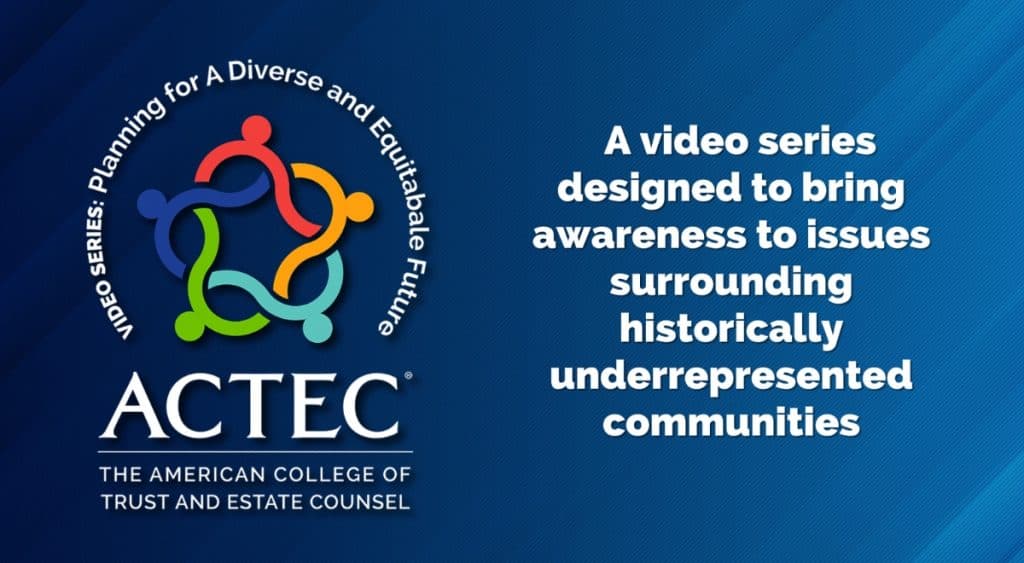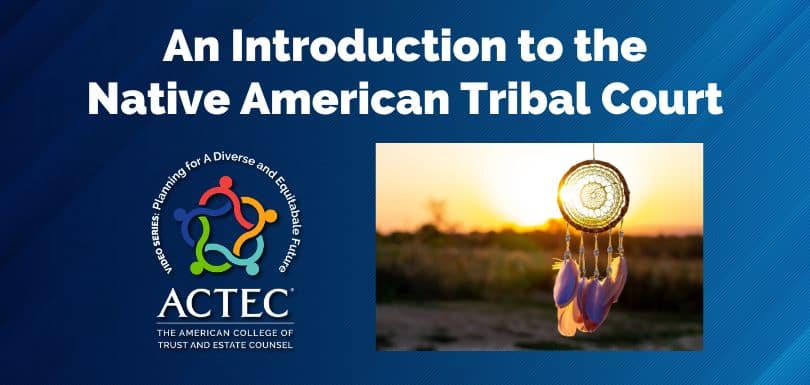Cultural competence in estate planning is vital because it ensures that the estate planner understands and respects their clients’ unique cultural values, traditions, and preferences, allowing for the creation of customized estate plans that align with the client’s cultural background. Awareness helps avoid potential conflicts and misunderstandings and promotes inclusivity and sensitivity in addressing the diverse needs of clients and their families.
ACTEC Fellows Fellows Hung Nguyen and Akane Suzuki discuss the differences between cultural sensitivity and cultural competence from the viewpoint of Asian American attorneys and explain why these skills are essential elements of effective estate planning. In addition, Hung and Akane provide practical guidance as to how attorneys may best address sensitive cultural topics with their clients.
“We are striving to forge our union with purpose. To compose a country committed to all cultures, colors, characters and conditions of man. And so we lift our gaze, not to what stands between us, but what stands before us.”
The Hill We Climb by Amanda Gorman, 2021 Inaugural Poet

Resources
- How to Increase Diversity in the Legal Profession
- ACTEC’s Statement Condemning Violence Against Asian American Pacific Islanders with Resources
- Howard University Law Library – Cultural Sensitivity Reference Books
- American Bar Association’s Diversity and Inclusion Center
- Beyond Bias — Cultural Competence as a Lawyer Skill – Michigan Bar Journal
Transcript
Introduction
ACTEC Fellow Terrence M. Franklin: ACTEC, like many organizations, has been looking in the mirror to see how we can be more culturally competent. Today, two Fellows of the College – Hung Nguyen from Coral Gables, Florida and Akane Suzuki from Seattle, Washington – discuss how our profession can become more culturally sensitive and, in turn, better attorneys.
ACTEC Fellow Hung V. Nguyen: So, we have been hearing a lot about attacks on Asian Americans in our country and some people have attributed it to the origins of the Coronavirus and others have talked about how this has been in the undercurrent for some time now in our country. Surely, this kind of hatred and hate crimes happening against Asian Americans didn’t happen overnight – like a forest fire that can easily catch ablaze because of long-term dry weather leaving vegetation very dry – there were probably long-standing issues underneath, in some people, that were easily lit and fanned.
With that as the backdrop, we feel it is appropriate to have a discussion regarding cultural awareness and cultural competency. So, let’s begin. Number one – what is cultural competence?
Cultural Competence and Cultural Sensititivy
ACTEC Fellow Akane R. Suzuki: There is a great deal of research and writing on the topic of cultural sensitivity and cultural competence, particularly in the field of health care and social work. From what I found in my research, the legal profession is a bit behind these other fields in recognizing the importance of culture.
Cultural sensitivity refers to being aware of cultural differences, and cultural competency is not only being aware of the differences but also having the ability to adapt your own behavior to find a common ground so that you can effectively communicate with others. In the estate planning context, it goes to the ability of the lawyer to establish trust with the client, and then to really hear what the client is saying so you can help the client achieve the goals. It is important for the estate planning lawyer to be culturally competent because our client base is increasingly diverse.
ACTEC Fellow Hung V. Nguyen: Thank you, Akane. Do you need to know a lot about the client’s specific culture in order to be culturally competent?
ACTEC Fellow Akane R. Suzuki: Thank you for that question. No. You don’t. You don’t need to know everything about the client’s culture to be culturally competent. That’s not really possible anyway. It helps to know some basic characteristics that are common to the client’s culture, but it is more about being open to the idea that the client may be coming from a different perspective and being willing to adjust your own behavior to connect with the client.
Actually, cultural knowledge alone, without having a cultural sensitivity piece, can lead to stereotyping, so it is an important distinction. The way I see it is that knowing some things about a particular culture can help you understand what the client may tell you, but you can’t make assumptions about that client based on that knowledge. You really have to listen first. To use a very simplistic example, many people in Japan love green tea. The tea ceremony is a form of art, and we put green tea powder in all sorts of sweets. If you know that, and you meet a client from Japan who tells you she loves green tea, it would probably seem understandable to you. You know, based on your knowledge about Japan, that green tea was likely readily available to her when she was growing up. You might even be able to share your own love of green tea or your experience of having been to a formal tea ceremony, and that can help you establish rapport with the client. On the other hand, if you meet a client from Japan and assume that she must therefore like green tea, that would be stereotyping.
It is difficult to resist the urge to stereotype because our brains are wired to filter input through our own experiences and then categorize information in ways that feel familiar to us, but that’s where we really need to resist the natural inclination.
ACTEC Fellow Hung V. Nguyen: Thank you, Akane. Now, let’s talk about Asian culture now. Asia, in the geographical sense of the word, is very large. Is there really such a thing as one Asian culture?
Asian Culture
ACTEC Fellow Akane R. Suzuki: You’re right – there isn’t. The continent of Asia is 80% of the Eurasian landmass, stretching from the Middle East to Russia and down to Indonesia. There are many different ethnic, religious, and cultural groups within this region, with many more subgroups within each.
Being someone who grew up in Japan, my “Asian” reference is really to the Japanese culture. I lived in Taiwan for a year and have a mother-in-law who is from Taiwan, so I have some familiarity with Taiwanese culture as well. So, that’s my “Asia.” I am sure my experience is different from yours, Hung, even though we both self-identify as “Asians.” The point is that “Asians” are really not one homogenous group at all. In addition, if you are talking to clients who moved to the U.S. from Asian countries, you have the additional element of people adapting to the American culture and modifying their behaviors over time.
Also, the cultural ties to the home country will lessen with each successive generation, so the experience of the first-generation immigrant client will be different from the experience of that person’s U.S.-born children. Personally, I have noticed over the years that my experience of having grown up in Japan as part of the majority ethnic group is very different from my Asian-American friends who grew up here in the U.S. So, there really is no one-size-fits-all, and that is really important to remember.
ACTEC Fellow Hung V. Nguyen: Thank you, Akane. With all that said, are there some common traits among East Asian clients? And are there any practice tips you can impart to us?
ACTEC Fellow Akane R. Suzuki: Yes. The idea of viewing estate planning as a family matter is a theme that I have observed in many of my Asian clients, many of whom are first-generation immigrants to the U.S. Especially with my older clients, once they start the estate planning process, I notice that they consult with and even defer to their adult children in their decision-making, especially with respect to healthcare decisions.
This is backed by research as well. In a 1995 medical study, the researchers found that people who were 65 and older, who self-identified as Korean Americans, were more likely than the other groups to conclude the family, rather than the patient, should make end-of-life decisions. The same study also found that only 47 percent of Korean Americans would have informed their sick family members that their diagnosis was serious, compared to 89 percent of African Americans and 87 percent of European Americans. The percentage was even lower if the diagnosis was terminal. This makes sense when you consider the fact that in East Asian countries, the concept of patient autonomy is still developing. Based on my own observation as well as comments from estate planning professionals that I work with in Japan, I know that the Durable Powers of Attorney – as we use them here – is still a very novel concept over there, and medical decisions continue to be handled informally by the family, especially for elderly or very ill patients.
I said earlier that “once they start the estate planning process, they tend to involve their children,” and that’s because just getting started with the process can be a big hurdle. A client who comes from a country where family members take care of each other without any need for legal documentation may not understand the need for a power of attorney and a health care directive.
On the inheritance side, too, the client may expect that the family will simply be able to work things out. For example, Japan does not have a probate system. Instead, the heirs divide up the assets and the debts by agreement after the decedent’s death. So long as they agree, they can divide up the estate however they want, even if there is a will that provides for a different allocation. Again, a client coming from a place like that may see little benefit in spending time and effort on an estate plan.
But we all know that the U.S. system is different. If the client is relying on her family to take care of her yet does not put in place documents that would allow them to do so, that can lead to a really bad result. At the same time, culturally, it is difficult to discuss death. From the older generation’s perspective, it is bad luck to discuss death; and since their own parents likely did not discuss it with them, they don’t have a model to follow. From the younger generation’s perspective, they usually see the need for estate planning because they grew up in the U.S. and they understand the need for legal documentation. They are also anxious to help their parents because they know that they will need those documents in order to do what’s expected of them. Yet, bringing up the topic is difficult because it is bad luck, and also, the children don’t want to seem like they are being presumptuous and asking about their future inheritance.
In these situations, a culturally competent lawyer can really provide value by being the bridge between the generations. As I said before, you don’t have to know the laws of the client’s home country to be able to do this. You just need to be aware that their expectations and assumptions about the system may be different. When I am not familiar with the client’s particular background, I find it helpful to ask them how the healthcare decisions are made or how the inheritance is handled in their home country so that I can point out to them the similarities and differences between what they know and the U.S. system. From there, we can have a meaningful discussion about their estate plan. So, the advice is to listen, but with some prompts to get the clients to share their perspectives.
ACTEC Fellow Hung V. Nguyen: Thank you for your observations, Akane. That was very helpful.
ACTEC Fellow Terrence M. Franklin: Hung and Akane shared important recommendations and experiences. This topic dovetails with our last video about How to Increase Diversity in the Legal Profession. A diverse workforce, combined with cultural competence, becomes a real differentiator for attorneys and firms.
Please visit ACTEC, actec.org/diversity for resources on this and other related topics. And make sure you subscribe to ACTEC’s YouTube channel to be informed of new videos as they become available.
Featured Video
An Introduction to Native American Tribal Court
Judge Joseph Wiseman, a tribal court judge, explains the interworking of the court, its jurisdiction, and its importance to Native American law and culture.
Planning for a Diverse and Equitable Future

ACTEC’s diversity, equity, and inclusivity video series analyzes issues surrounding racism, sexism, and discrimination in all its forms to combat inequality.

